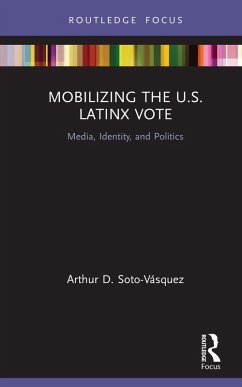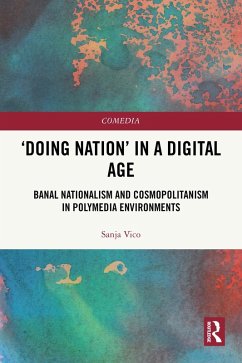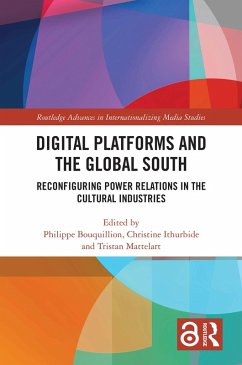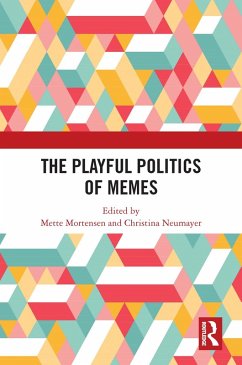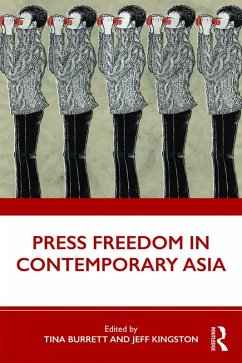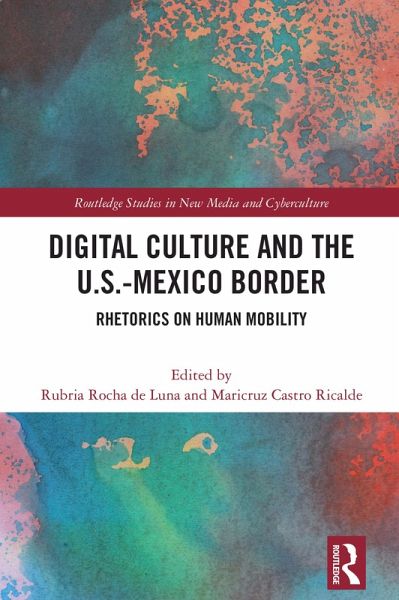
Digital Culture and the U.S.-Mexico Border (eBook, PDF)
Rhetorics on Human Mobility
Redaktion: Rocha de Luna, Rubria; Castro Ricalde, Maricruz
Versandkostenfrei!
Sofort per Download lieferbar
42,95 €
inkl. MwSt.
Weitere Ausgaben:

PAYBACK Punkte
21 °P sammeln!
Conceptualizing how digital artifacts can function as a frontier mediated by technology in the geographical, physical, sensory, visual, discursive, and imaginary, this volume offers an interdisciplinary analysis of digital material circulating online in a way that creates a digital dimension of the Mexico-U.S. border.In the context of a world where digital media has helped to shape geopolitical borders and impacted human mobility in positive and negative ways, the book explores new modes of expression in which identification, memory, representation, persuasion, and meaning-making are created, ...
Conceptualizing how digital artifacts can function as a frontier mediated by technology in the geographical, physical, sensory, visual, discursive, and imaginary, this volume offers an interdisciplinary analysis of digital material circulating online in a way that creates a digital dimension of the Mexico-U.S. border.
In the context of a world where digital media has helped to shape geopolitical borders and impacted human mobility in positive and negative ways, the book explores new modes of expression in which identification, memory, representation, persuasion, and meaning-making are created, experienced, and/or circulated through digital technologies. An interdisciplinary team of scholars looks at how quick communications bring closer transnational families and how online resources can be helpful for migrants, but also at how digital media can serve to control and reinforce borders via digital technology used to create a system of political control that reinforces stereotypes. The book deconstructs digital artifacts such as the digital press, social media, digital archives, web platforms, technological and artistic creations, visual arts, video games, and artificial intelligence to help us understand the anti-immigrant and dehumanizing discourse of control, as well as the ways migrants create vernacular narratives as digital activism to break the stereotypes that afflict them.
This timely and insightful volume will interest scholars and students of digital media, communication studies, journalism, migration, and politics.
In the context of a world where digital media has helped to shape geopolitical borders and impacted human mobility in positive and negative ways, the book explores new modes of expression in which identification, memory, representation, persuasion, and meaning-making are created, experienced, and/or circulated through digital technologies. An interdisciplinary team of scholars looks at how quick communications bring closer transnational families and how online resources can be helpful for migrants, but also at how digital media can serve to control and reinforce borders via digital technology used to create a system of political control that reinforces stereotypes. The book deconstructs digital artifacts such as the digital press, social media, digital archives, web platforms, technological and artistic creations, visual arts, video games, and artificial intelligence to help us understand the anti-immigrant and dehumanizing discourse of control, as well as the ways migrants create vernacular narratives as digital activism to break the stereotypes that afflict them.
This timely and insightful volume will interest scholars and students of digital media, communication studies, journalism, migration, and politics.
Dieser Download kann aus rechtlichen Gründen nur mit Rechnungsadresse in A, B, BG, CY, CZ, D, DK, EW, E, FIN, F, GR, HR, H, IRL, I, LT, L, LR, M, NL, PL, P, R, S, SLO, SK ausgeliefert werden.





